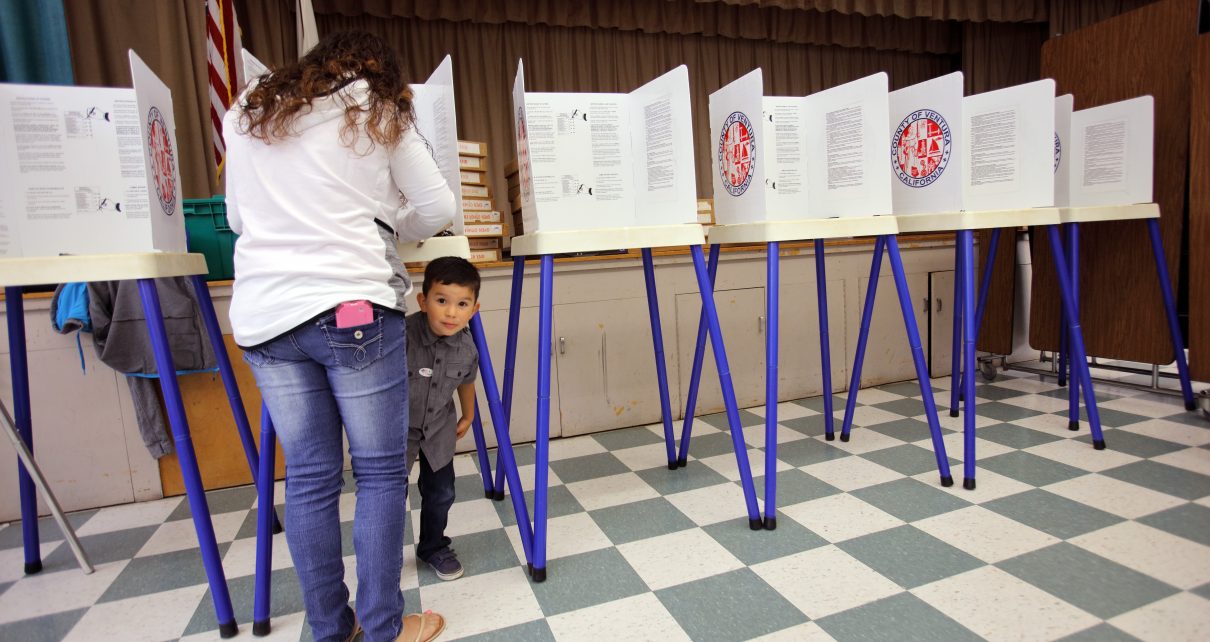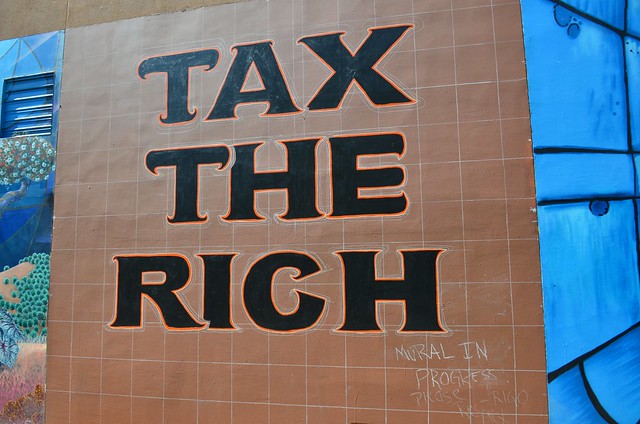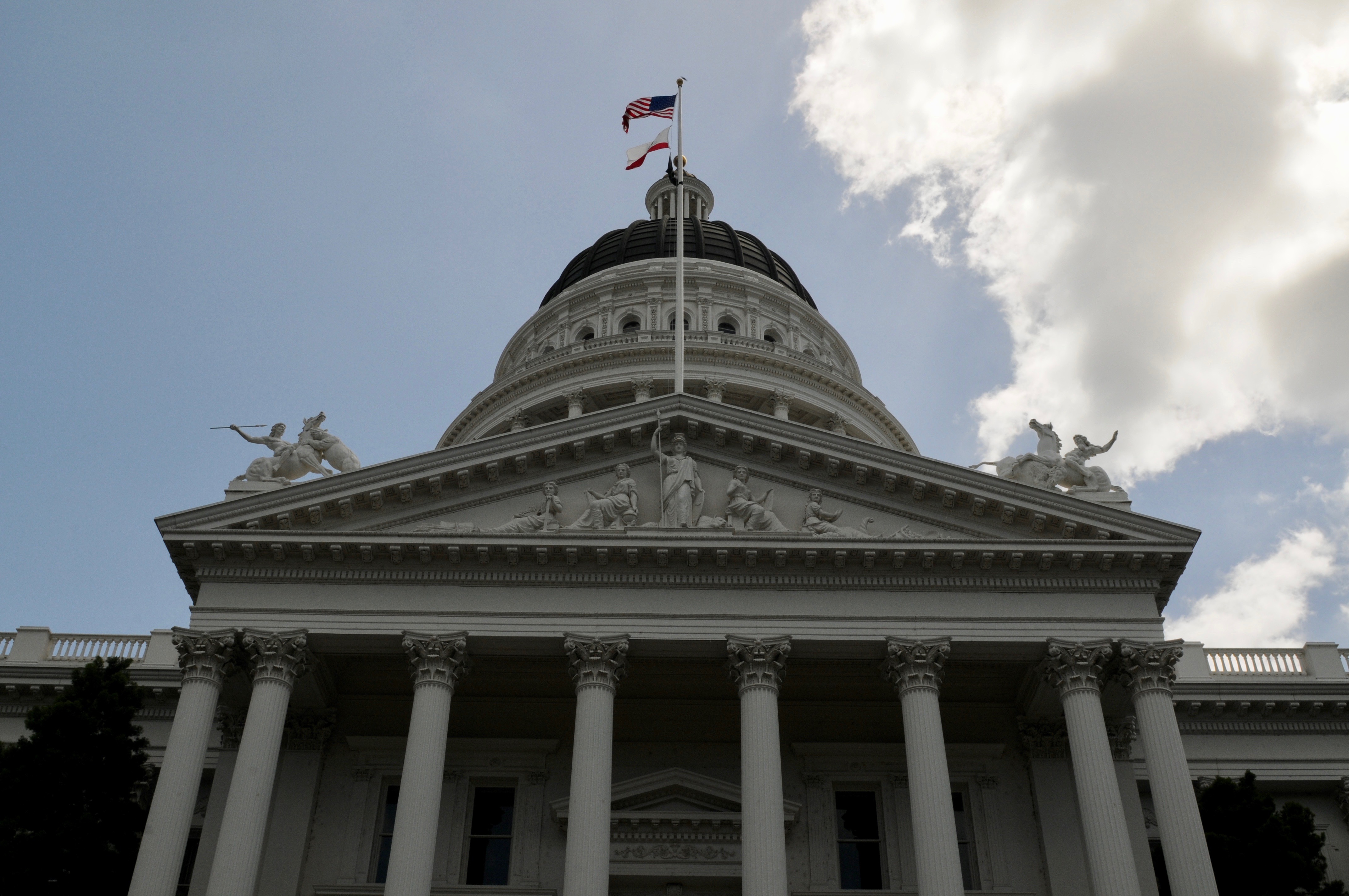
Boy looks under voting booth at Ventura Polling Station for California primary Ventura County, California, Ventura County, CA, Jun. 7, 2016. (Photo: Joseph Sohm/Shutterstock)
California Voters Approve Over $3.0 Billion Per Year in New Local Taxes
Voters did not approve a single statewide tax or bond proposal
By Edward Ring, January 24, 2023 7:27 am
When state ballot initiatives propose new taxes, it’s big news. This past November, voters rejected Proposition 30, which would have added another 1.75 percent tax on personal income above $2.0 million. The arguments for and against Prop. 30 were litigated in saturation level television campaigns waged by both sides; total expenditures were nearly $70 million.
But while every election features a handful of state tax and bond proposals that get statewide attention, additional hundreds of local state and bond proposals fly under the radar. Fortunately, after each election cycle and once all the votes are certified – something that in California doesn’t occur until 30 days after election day – the California Taxpayers Association puts out a report that shows the outcome of every local tax and bond proposal.
The impact of these hundreds of bids to raise taxes and increase borrowing, as documented by CalTax, in sum can exceed the amounts of the statewide initiatives.
We saw this demonstrated yet again this past November, when 131 bond proposals were placed on local ballots up and down the state, along with 234 local tax proposals. Of the proposed local bonds, 86 percent of them were approved by voters, dumping another $23.2 billion in debt onto Californians. In terms of budget impact, based on a 5 percent interest rate and a 30 year term, this new borrowing is going to cost taxpayers another $1.5 billion per year in principal and interest payments.
The fate of local tax proposals tells a similar story. 65 percent of them were approved by voters, adding another $1.6 billion annual burden onto California’s taxpayers.
These local increases in taxes and borrowing, which are almost exclusively regressive and will cost taxpayers at least another $3.1 billion per year, are comparable to the impact of Prop. 30, had it passed. Prop. 30, which would have affected California’s already overtaxed wealthy households, was estimated to bring in between $3.0 and $5.0 billion per year.
It’s interesting to see the categories of new local taxes. Note the projected big earner categories: “Documentary Transfer Tax,” “Gross Receipts Tax,” and “Transactions and Use Tax” (sales tax). The first two of these three are relatively recent innovations in a system that for decades relied primarily on sales tax. Expect more innovative tax schemes, such as “Vacancy Tax,” presumably designed to discourage people from owning real estate unless they plan for it to be occupied.

The propensity for voters to approve local taxes is well documented, as the next chart proves. The only category that has not performed extraordinarily well over the past ten years are General Obligation Bonds, which, still while more likely than not to pass, rarely deliver supermajority rate of approval. This is because School Bonds only require a 55 percent majority in order to pass, whereas General Obligation Bonds require a two-thirds majority.
When proponents only have to get 55 percent of voters to approve a bond, it does pretty well. Measured by the amount of proposed borrowing, school bonds consistently log over 90 percent approval by California’s local voters. The payments to service these bonds typically appear on the property tax bills of homeowners, and the amounts are not trivial. Most Californians can expect to pay considerably more than the legislated maximum of 1 percent of their home’s value, mostly thanks to local school bonds that are exempt from these limits.
As for local taxes, 2022 was a below average year for proponents, passing “only” 65 percent of them by number, and 59 percent by amount. While highly favoring proponents, this rate of approval is considerably lower than in previous elections, and may indicate voter fatigue with new taxes.

Compared to other elections in the past decade, 2022 was not bad. While California taxpayers added over $3.0 billion to their annual tax burden, voters did not approve a single statewide tax or bond proposal.
It’s a little early to look ahead to 2024, but three initiatives have already qualified for the November 2024 ballot. One of them aims to “increase personal income taxes to fund pandemic detection and prevention.” Expect additional statewide proposals to increase taxes, since California’s much vaunted budget surplus has evaporated. Voters may also count on hundreds of local tax and bond proposals, and if history is any guide, shall approve the vast majority of them.
- Ringside: Can Energy and Water Interests Find a Common Agenda? - February 26, 2026
- Ringside: What Will California Gas Prices Do in 2026? - February 19, 2026
- Ringside: Large Scale Desalination Belongs in California’s Water Strategy - February 12, 2026





Californians love their bonds, taxes, and nanny-state government.
None of my family or friends voted for a tax increase. Our vote is compromised by dominion machines. We’ve been disenfranchised.
Caltrans gave a presentation to my county supervisors this week. They want to start charging people per mile driving to pay for the roads (they don’t actually repair). They want us to look at it as another utility type fee. Enforcement alone will create more bureaucracy. Apparently the gas tax and the registration money wasn’t enough for them. They also said that it would eventually replace the gas tax but they may need to keep charging it until the bugs are worked out. Katy, there needs to be an article on this.